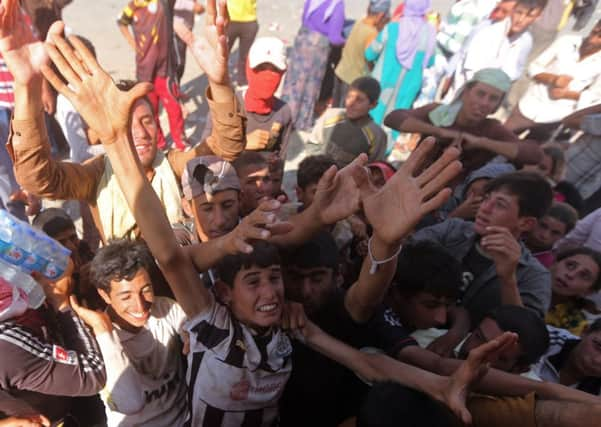UK will help Iraqi refugees but ‘won’t join fight’


As fears mount over the plight of communities targeted by Islamic State (IS) militants, the Prime Minister described their situation as “desperate”, with people who are “exposed, starving and dying of thirst”.
After chairing a meeting of the government’s Cobra emergency committee, he said “detailed plans” were being put in place for a multilateral rescue effort.
Advertisement
Hide AdAdvertisement
Hide AdBut defence experts warned any such mission came with “intrinsic risks”, with the prospect of a helicopter-led operation likely to require a “fully fledged air campaign” to prevent rebels shooting the aircraft down.
It comes as Mr Cameron refused to bow to mounting cross-party pressure to join US military strikes on IS forces, stressing that the country was committed to a “humanitarian operation”.
Mr Cameron said he was “proud” of the role played by the RAF in dropping aid to the minority population trapped by the extremist advance on Mount Sinjar. He confirmed plans to try and move the refugees – whose number is estimated at between 20,000 and 30,000 – to safety.
“We need a plan to get these people off that mountain and get them to a place of safety,” he said. “I can confirm that detailed plans are now being put in place and are under way, and that Britain will play a role in delivering them.”
Mr Cameron declined to give any details of the mission, such as whether Chinook helicopters being sent to the region could play a role in any evacuation.
Asked about calls for the UK to follow France in arming Kurdish fighters, or to commit British fighter planes to air strikes, he said: “The first thing is to deal with this desperate humanitarian situation with people who are exposed, starving and dying of thirst … getting them to a place of safety.
“Of course, we do support the Kurds and we should continue to support the Kurds, and in terms of the ammunition they are getting Britain is playing a role in helping to get that to them.
“What they want is ammunition and weapons like they have been using and so that is what is being delivered to them.”
Advertisement
Hide AdAdvertisement
Hide AdOn whether he would bring MPs back from their summer break to discuss the crisis, he added: “This is a humanitarian operation that Britain is involved in, so I don’t think it’s necessary to recall parliament for that. I always keep this issue under review and, were this to change, that is obviously something that could be done.”
European Union foreign ministers will meet tomorrow to discuss the crisis in Iraq, as well as the latest developments in Ukraine, the EU’s foreign affairs chief Baroness Ashton announced yesterday.
While details of the rescue operation have yet to be ratified, analysts said the two likeliest approaches – creating a safe corridor on the ground for the refugees or using helicopters to airlift them – came with risks.
Professor Michael Clarke, director-general of the London-based Royal United Services Institute, said: “Neither of them are terribly attractive. They can both be done, but both of them carry intrinsic risks.”
The corridor option is “more intensive on the ground” as forces would have to be prepared to fight to maintain safety while people are brought out, Mr Clarke said.
He explained that an airlift would probably have to involve helicopters due to the lack of suitable landing space for planes. The vulnerability of helicopters made this “more fraught” than a corridor, he said, adding that it would take a lot longer as Chinook helicopters could only rescue around 30 people at a time.
A “fully fledged air campaign” would have to be mounted to stop the rebels from shooting the helicopters down, he noted.
Labour leader Ed Miliband said the UK must do all it can to assist the “vital” international effort to rescue those stranded on Mount Sinjar in their “hour of need”.
Advertisement
Hide AdAdvertisement
Hide AdHowever, Mr Cameron is coming under pressure to recall parliament to allow MPs to vote on whether the UK should join the US in air strikes on IS positions and arm the Kurds.
Among those joining the call for firmer action is former defence secretary Liam Fox who said the UK must not be seen as a “reluctant ally”.
He said: “I think we’ve got two options: we’ve got the option of using our own air power to diminish the capability of IS; we’ve got the ability to give weapons to the Kurds and to other groups who are fighting IS or a combination of the two, and I think we should do so.”